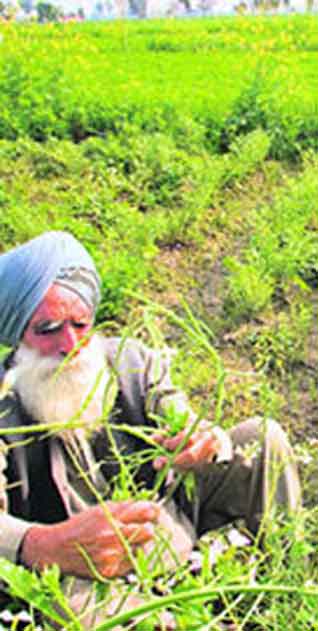Current Events
Project Sustain Punjab
ANGAD SINGH & CHRIS CANALES
Once the most prosperous states in India, Punjab is now broken.
India’s breadbasket region brought prosperity to farmers for centuries, especially in the mid-20th century through its much hailed Green Revolution.
But mistreatment and misuse of the natural resources -- and a concerted effort on the part of the central government to treat it like a step-child -- in more recent times has led to the state’s downturn in a huge way.
If current trends continue, Punjab -- whose name literally translates to the ‘land of five rivers’ -- will be completely dry in 15-20 years.
The impact on agricultural production has been devastating to the farmers who are primarily Sikhs, and the long spell of decreased yields has led to many social, economic, and environmental challenges that have further manifested themselves as serious health-related issues.
As Sustainable Development majors at Columbia University, we look at Punjab and feel a deep sense of social responsibility to inspire change in the region. There is no big, quick fix to all of Punjab’s problems. There are only long and slow ones that first require awareness.
That is where this project comes in.
PHASE ONE: DOCUMENTARY
Last summer, award-winning filmmaker Angad Singh worked with the Akal Academy education network in Punjab and traveled across the state teaching high school aged youth about the issues that modern Punjab faces.
His lectures and workshops were designed to create awareness about the issues of environmental degradation caused by the green revolution, poverty-traps and economic spirals, drug addiction, female abuse, farmer suicide, increasing cancer rates, and the loss of the Sikh identity in the homeland of the Sikhs.
We have discussed Angad’s work at length, and as a third-year Sustainable Development major, Chris Canales is also interested in the challenges that Punjab faces and how to work through them.
Over the course of this academic year, we have been making videos for fun through our group, ‘Columbia Style’, but have been contemplating working on a much more serious project.
To begin this endeavour we want to travel to Punjab and spend a short period of time (about one week) at a university interviewing professors and experts on the agricultural issues of Punjab and the resulting social, economic, environmental, and medical issues.
This will be our research phase during which we take a more in-depth look, with input from local experts, at the specific issues plaguing the region.
Our next phase will be to travel around rural Punjab for about four weeks. We will travel to villages, farms, and industrial centers to conduct interviews and collect evidence of the issues we had identified as most important and pressing. During this time, we will stay at Akal Academy boarding schools, trading teaching time for room and board.
Finally, the last part of our trip will consist of working with the school system to raise awareness about these issues and to brainstorm and develop solutions with local youth. We plan to visit schools across Punjab for two to three weeks.
Angad will take the opportunity to work with Sikh youth and talk about identity issues, how they are related to Punjab’s problems, and how they can be key to potential solutions. Issues of identity go hand in hand with the development of the region, and this will be reflected in our documentary.
Chris will educate students about sustainable agricultural practices, keys to conservation of natural resources, and methods for organizing others to inspire change.
Upon our return, we will edit our findings into our final product. Our documentary will be a feature length film and, upon completion, we will use it to create awareness about the issues facing Punjab.
We intend to screen the documentary at our university and many other universities with student bodies interested in development, public health, and other related issues. This film itself will highlight the tragedies that Punjab faces while seeking to develop ties within and external to the region that could lead to future solutions.
Subplots will include the development of the relationships that we develop with the region and its people (as well as our own friendship), Chris’ introduction to life in rural Punjab (his work has previously focused on the Americas), and a profile of local thinkers and professors and their struggle to create change in the region.
Through interviews with professors at Punjab Agricultural University, villagers, farmers, students, and teachers, we will paint a picture of life in Punjab and how it could be improved.
PHASE TWO: INITIATIVE
During the end of the summer and the fall semester of 2013, we will develop and implement an initiative to engage students and faculty in the Earth Institute at the Sustainable Development, Earth and Environmental Engineering, and other departments at Columbia and entities in working with Punjab’s youth to find solutions to the problems.
The initiative will solicit proposals for student-led and faculty-sponsored projects, papers, and proposals that address specific problems in Punjab and develop unique solutions to the region’s environmental, economic, social, and medical crises. Our long-term goal is to form a bond between our student body and Punjab and create lasting developmental ties with the region.
WE NEED YOUR HELP
When we first put together our plan for this project, we knew we had the experience and know-how to make it happen. As current university students, we knew all we needed were the resources to back us up. The project will be funded both out of our own pockets and by the generous support of donors (like you!)
Our travel expenses have already been covered by a generous donation.
We thought you would like to know what your money will be used for when you donate, so below is a list of things that we still need covered:
• Cannon T3i Camera and accessories
• GoPro Camera Kit and accessories
• Tripod and stabilizer kit
• Lighting kit
• Sound equipment
If you would like to sponsor a specific item, let us know by emailing sustainpunjab@gmail.com. To make a contribution to our project, you can CLICK here.
Angad and Chris leave for Punjab on June 7, 2013
Angad Singh is a first-year Sustainable Development major at Columbia University. He is an experienced independent documentary filmmaker and has made three award-winning films: One Light in 2007, Roots and Wings in 2009, and (Ex) Changed in 2011. He was named Most Promising Documentarian at the Action/Cut Film Festival in 2011 and won Best Documentary at the International Family Film Festival. Visit Onelight-films.com for more.
Chris Canales is a third-year Sustainable Development major at Columbia University. He has nine years of experience in both broadcast and print journalism and has received awards from the National Scholastic Press Association and the Associated Press. His development work has focused on rural infrastructure development, especially water and electrification projects in Latin America.
May 29, 2013
Conversation about this article
1: R Singh (Surrey, British Columbia, Canada), May 30, 2013, 1:02 AM.
I am no fan of the "green" revolution of the 1970s. It made independent farmers dependent on foreign seeds and foreign fertilization. It caused the depletion of the nutrients in the ground due to the vast amount of irrigation required to produce the introduced wheat, make Punjab which was semi-arid, into a desert.
2: Gay Bawa Odmark (Ketchum, Idaho, USA), October 09, 2013, 1:59 PM.
A wonderful purpose to educate the youth in their own region and to change and affect change through the brightest minds available. Concepts are in the head but on the ground educators like Angad and Chris can change as many lives as they touch. I look forward to hearing more and would like to have a viewing of this film here in Sun Valley, Idaho.





